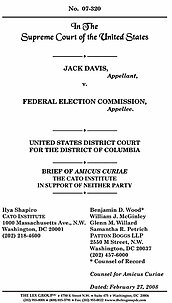Learn more about Cato’s Amicus Briefs Program.
The “Millionaires’ Amendment,” section 319 of the Bipartisan Campaign Finance Reform Act of 2002 (“BCRA,” commonly known as McCain-Feingold), attempts to discourage candidates for election to Congress from spending more than $350,000 from their own personal funds. It effectively penalizes expenditures above that threshold by enhancing the political speech of the self-financing candidate’s opponent through increased contribution limits and unlimited coordinated party expenditures. Cato’s brief argues that this penalty unconstitutionally chills a self-financing candidate from engaging in protected political speech beyond that personal funds ceiling, and does so without serving any governmental interest recognized as compelling by the Supreme Court’s campaign finance precedent. The penalty does not prevent actual or apparent corruption because there is no threat of a quid pro quo from a candidate’s expenditure of her own funds. And the Supreme Court has expressly rejected the district court’s rationale for upholding Section 319 – “leveling the playing field” of financial resources – as an interest sufficient to justify infringement of First Amendment rights.

This work is licensed under a Creative Commons Attribution-NonCommercial-ShareAlike 4.0 International License.

